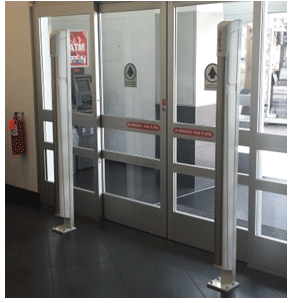
Every day I see news articles about employee theft. That does not even cover a fraction of the employee theft occurring both know or unknown. The fact is that approximately 45% of a Retailer’s losses are due to employees stealing. We focus so heavily on shoplifting that many times a Retailer misses the boat completely. Do not misinterpret what I am saying, shoplifting is responsible for about 35 percent of a Retailer’s losses. Which is also huge.
However, employees have access to your cash, supplies, and merchandise. Employees are generally trusted until they show us that they are not. Which may be too late! Many Retailers I have discussed this with over the years tell me that they trust their employees and treat them well. Therefore they would not steal from them. Those are the folks that have the worst losses and the biggest shock when it does happen. As human beings, we do not want to believe that someone would steal from us. We also are quick to turn a blind eye to the evidence even when it hits us in the head. We simply do not want to believe it.
Another factor is that many Retailers do not know, understand and are afraid to do something. Will we make a mistake? Would we accuse someone of something they did not do? What civil and criminal consequences do we face? And the list goes on. This is yet another stalling factor for not doing anything.
Quit stalling about employee theft. You face every other retail problem head on why not this. Educate yourself. We can help you with this. Make sure you know the signals of employee theft. Yes, employees who steal, act differently than other employees. You simply need to know what to listen and watch for. Do you “audit” your operation? For example, an audit can be as simple as making sure the Point-Of-Sale balances every day and if it does not, find out why. I have seen many Owners and Managers that say if the drawer is short $5 or less, they do not look into it because “it is not worth my time”, REALLY??? THAT IS SO WRONG and dangerous!!!! First by having a policy like this you are telling everyone that stealing $4.99 and below is okay. $4.99 times 365 days a year is a loss of $1,821.35. Oh, and that kind of theft WILL lead to larger and more frequent employee theft.
Over my career, I have investigated, interrogated and put in jail somewhere north of 2300 employees for theft. The vast majority of those employees that were stealing did it for the same reasons. Many still stole even those the boss was “good to them”. I have seen employees that had been loaned large amounts of money by their employer, employees that were being put through school by their employer steal with no regret except for being caught.
We can train you to spot employee theft and what to do about it when you suspect and find it. It is not hard to do. We can show you how to “test” employees to see if they are stealing. We can help you build the confidence to be on the offense, not the defense. Your good employees will not care or suffer. In fact, they will help you. You just need to know how to proceed.
Would you knowingly buy a car that had major engine and transmission problems? Probably not. So why would you hire someone with a criminal record? Why would you not find out that they have problems with violence, theft, drugs and worse when it is so simple, fast and cost-effective to do so? We can help you with that also. We conduct pre-employment screening, drug testing and more, nationwide. Look at it this way, you interview, select, employ, train, invest in an employee just to find out the hard way that they are very familiar with employee theft? When a pre-employment screening costs $20 how can you afford not to. Drug testing is also very inexpensive. You can quickly, cheaply and easily have a pre-employment drug testing done on all of your employment candidates when you offer them the position. Again, we conduct pre-employment screening and drug testing nationwide.
You control every other aspect of your business, why would you not take more control of employee theft? Contact us today or call toll free 1-770-426-0547.

 Do you want to know one of the fastest ways to make a Loss Prevention Manager cringe? Place high dollar merchandise within a few feet of your entrance/exit doors. Another great idea is to stack out a pallet of 32 inch LCD televisions for that Black Friday door buster with no protective devices on them because you know how fast they are going to go out the door (the L.P. Manager knows how fast too but from a different perspective). Frequently store managers want to put merchandise on display near the front of the store where customers are certain to see the items and entice them with an impulse buy. The downside to the strategy is that it creates a major opportunity for crooks to sneak merchandise out quickly without being noticed. They wait for a group of people to enter or leave, pick up the merchandise and blend in with the crowd then exit with the goods. I’ve seen it happen.
Do you want to know one of the fastest ways to make a Loss Prevention Manager cringe? Place high dollar merchandise within a few feet of your entrance/exit doors. Another great idea is to stack out a pallet of 32 inch LCD televisions for that Black Friday door buster with no protective devices on them because you know how fast they are going to go out the door (the L.P. Manager knows how fast too but from a different perspective). Frequently store managers want to put merchandise on display near the front of the store where customers are certain to see the items and entice them with an impulse buy. The downside to the strategy is that it creates a major opportunity for crooks to sneak merchandise out quickly without being noticed. They wait for a group of people to enter or leave, pick up the merchandise and blend in with the crowd then exit with the goods. I’ve seen it happen. Loss Prevention is a wonderful career choice that can lead to other positions in retail. There are, however tips I wish I had known before I began the job that would have prepared me for the adventure I was about to embark on. I started out in a Loss Prevention Associate position after spending four years as a U.S. Air Force Law Enforcement Specialist and another 2 ½ years earning a Bachelor’s Degree.
Loss Prevention is a wonderful career choice that can lead to other positions in retail. There are, however tips I wish I had known before I began the job that would have prepared me for the adventure I was about to embark on. I started out in a Loss Prevention Associate position after spending four years as a U.S. Air Force Law Enforcement Specialist and another 2 ½ years earning a Bachelor’s Degree. Loss Prevention Managers and Associates use audits on a regular basis to keep track of merchandise that may be potentially high theft items. The items may be high dollar such as iPods, laptops, computer tablets and so on. The products being audited may simply be easy to steal and resell. Such items can include a variety of products ranging from drill bits to medicines, razor blades and even fragrances. Audits are an effective tool for Loss Prevention departments to quickly identify theft trends and to begin investigating when and how losses are taking place. For stores that cannot afford a Loss Prevention department, it falls upon store owners and managers to investigate missing merchandise. The question then becomes, how does a management team decide what items should be audited or when audits should take place?
Loss Prevention Managers and Associates use audits on a regular basis to keep track of merchandise that may be potentially high theft items. The items may be high dollar such as iPods, laptops, computer tablets and so on. The products being audited may simply be easy to steal and resell. Such items can include a variety of products ranging from drill bits to medicines, razor blades and even fragrances. Audits are an effective tool for Loss Prevention departments to quickly identify theft trends and to begin investigating when and how losses are taking place. For stores that cannot afford a Loss Prevention department, it falls upon store owners and managers to investigate missing merchandise. The question then becomes, how does a management team decide what items should be audited or when audits should take place?  I recently read an article entitled “How to spot a liar in your inbox” by Vanessa Van Edwards. The article discussed the nuances of how to tell if someone is lying to you in an email. The writer made some interesting observations on the lack of personal pronouns in the body of an email, inconsistency in tense usage and vague language. It dawned on me that often this is the same thing supervisors handle on a regular basis with employees. Think back to a phone call you have taken from an employee calling out of work. Often the conversation goes something like this, “I don’t feel well, I think I am going to have to call out today.” The employee is using language that does not make sense. They “think” they have to call out. Either they do or they don’t have to call out, the decision is theirs to make. Saying “I think” sounds more like asking permission to call out than making a decision of their own. Avoiding responsibility is one way an employee may try to lie without feeling guilty about it.
I recently read an article entitled “How to spot a liar in your inbox” by Vanessa Van Edwards. The article discussed the nuances of how to tell if someone is lying to you in an email. The writer made some interesting observations on the lack of personal pronouns in the body of an email, inconsistency in tense usage and vague language. It dawned on me that often this is the same thing supervisors handle on a regular basis with employees. Think back to a phone call you have taken from an employee calling out of work. Often the conversation goes something like this, “I don’t feel well, I think I am going to have to call out today.” The employee is using language that does not make sense. They “think” they have to call out. Either they do or they don’t have to call out, the decision is theirs to make. Saying “I think” sounds more like asking permission to call out than making a decision of their own. Avoiding responsibility is one way an employee may try to lie without feeling guilty about it.

 Wal-Mart has a unique way to cut down on shoplifting
Wal-Mart has a unique way to cut down on shoplifting